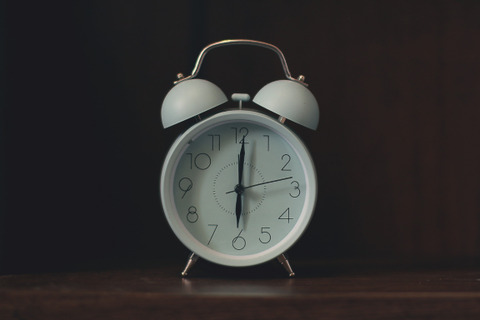
Create a Consistent Sleep Schedule
One of the simplest and most effective ways to improve your sleep is to keep a regular sleep schedule. Your brain relies on predictable rhythms to decide when to release hormones that promote rest. If you go to bed at different times every night your internal clock loses its sense of direction which makes falling asleep harder. Even one or two days of inconsistency can throw off your rhythm for the rest of the week.
Choosing a set bedtime and wake time gives your body structure. You might not drift off instantly, but the act of settling at the same time each night teaches your mind what to expect. A common myth is that you can catch up on sleep during the weekend, but studies suggest that irregular patterns often make fatigue worse. Staying consistent builds a stable foundation for deeper rest.
Build a Calming Night Routine
Your mind needs a runway to land properly. Jumping straight from stimulation to sleep rarely works, especially if you deal with insomnia. A calming routine signals to your body that it is time to slow down and transition into rest.
A simple routine might include turning down lights, preparing your space, stretching gently, or reading something light. Avoiding screens is also useful because the light they emit can confuse your brain into thinking it should stay alert. If you can’t avoid them all together, use a blue light filter or get some blue light glasses. You can also try warm showers, herbal teas, or soft music. You are guiding your nervous system into a softer state, and this makes a noticeable difference when your goal is steady sleep.
Create a Sleep Friendly Environment
Your bedroom conditions influence your ability to fall asleep more than most people realize. A room that is too warm, too bright, or too cluttered can keep your brain alert even when your body is exhausted.
You can experiment with cooler temperatures, blackout curtains, quiet surroundings, and comfortable bedding. Many experts believe that your bedroom should be associated with relaxation and nothing else. When you use it as a workspace or entertainment zone your mind may struggle to separate rest from responsibility. A peaceful environment builds trust in the space which helps you unwind faster.
Understand the Role of Stress and Worry
Stress is one of the biggest barriers to healthy sleep. Your mind might replay conversations or list unfinished tasks while your body is trying to rest. When this happens regularly your nervous system becomes trained to stay alert at night which leads to racing thoughts and shallow sleep.
Finding ways to release stress before bed can help. Journaling your thoughts, planning the next day, or practicing breathing techniques may ease mental tension. Some people believe that forcing themselves to relax will help, but pressure often increases anxiety. Gentle approaches tend to work better. Supporting your mental clarity before bed makes it easier to quiet your thoughts once you are under the covers.
Reduce Stimulants and Late Eating
Your choices throughout the day influence how well you sleep at night. Caffeine stays in your system far longer than most people expect. Even afternoon coffee can affect your sleep cycle because your brain remains activated. Energy drinks, chocolate, and some teas also contain stimulating compounds, and they can disrupt your ability to unwind.
Eating large meals right before bed can also cause discomfort that keeps you awake. Your body will be busy digesting instead of resting which can lead to bloating or discomfort. Choosing lighter snacks in the evening and limiting stimulants gives your system the chance to slow down naturally.
Exercise at the Right Time
Movement can improve sleep quality because it helps regulate hormones, supports mood balance, and reduces tension. The challenge is timing. Exercising too close to bedtime can increase alertness which makes it harder to settle. Earlier exercise supports deeper rest because it burns excess energy and encourages your body to seek recovery at night.
This does not mean you need intense workouts. Even gentle activity like walking or stretching can support healthier sleep. Many experts believe that physical activity during the day helps the body feel naturally ready for rest once evening arrives.
Reset a Disrupted Sleep Cycle
If your sleep has been off for a long time you may need to reset your rhythm instead of trying to force sleep. Going to bed a little earlier each night until you reach your ideal bedtime can help your body adjust gradually. Sunlight exposure in the morning also supports your internal clock because it signals wakefulness and builds a clear day night pattern.
Avoid the temptation to nap for long periods during the day. Short naps can refresh you, but long ones may confuse your rhythm and increase nighttime insomnia.
Frequently Asked Questions
1.Why do I fall asleep easily but wake up during the night
This can happen when stress, inconsistent routines, or environmental disturbances interrupt your natural sleep cycle. Small changes to your habits often bring improvement.
2.Is it normal to take a long time to fall asleep
It can be normal during stressful periods, but if it happens regularly you may need a more structured sleep routine to help your mind wind down.
3.Do supplements help with sleep
Some people find herbal supplements useful, but they are not a replacement for healthy habits. Speak with a healthcare provider if you are unsure what is right for you.
4.Should I stay in bed if I cannot fall asleep
It is helpful to get up and do something calming. Staying in bed awake sometimes trains your brain to associate your bed with stress instead of rest.
Sleep can feel like one of those things you should not have to think about, yet many people find themselves lying awake at night wondering why their minds will not switch off. When you look at how your sleep habits shape your day it becomes clear that the quality of your rest influences everything from your mood to your ability to focus. Good sleep is not only beneficial for physical recovery, it’s a mental reset, helps to balance emotions, and gives you general survival fuel. If you have ever struggled with tossing and turning or waking up feeling as though you barely rested then you already know how quickly poor sleep can spill into the rest of your life.
Let's explore the actions that support better sleep and the habits that may be keeping you stuck. You will learn how your lifestyle choices influence your nights and what can help you find a rhythm that finally supports deep rest. Many experts believe that consistent sleep routines can transform both sleep quality and daily energy. Whether you deal with occasional sleepless nights or stubborn insomnia there are practical changes that can bring noticeable relief. Good sleep is not about perfection. It is about building patterns that help your body feel safe enough to relax. Once you understand what strengthens healthy sleep it becomes much easier to rebuild your nights and give your mind the space it needs to settle.
Create a Consistent Sleep Schedule
One of the simplest and most effective ways to improve your sleep is to keep a regular sleep schedule. Your brain relies on predictable rhythms to decide when to release hormones that promote rest. If you go to bed at different times every night your internal clock loses its sense of direction which makes falling asleep harder. Even one or two days of inconsistency can throw off your rhythm for the rest of the week.
Choosing a set bedtime and wake time gives your body structure. You might not drift off instantly, but the act of settling at the same time each night teaches your mind what to expect. A common myth is that you can catch up on sleep during the weekend, but studies suggest that irregular patterns often make fatigue worse. Staying consistent builds a stable foundation for deeper rest.
Build a Calming Night Routine
Your mind needs a runway to land properly. Jumping straight from stimulation to sleep rarely works, especially if you deal with insomnia. A calming routine signals to your body that it is time to slow down and transition into rest.
A simple routine might include turning down lights, preparing your space, stretching gently, or reading something light. Avoiding screens is also useful because the light they emit can confuse your brain into thinking it should stay alert. If you can’t avoid them all together, use a blue light filter or get some blue light glasses. You can also try warm showers, herbal teas, or soft music. You are guiding your nervous system into a softer state, and this makes a noticeable difference when your goal is steady sleep.
Create a Sleep Friendly Environment
Your bedroom conditions influence your ability to fall asleep more than most people realize. A room that is too warm, too bright, or too cluttered can keep your brain alert even when your body is exhausted.
You can experiment with cooler temperatures, blackout curtains, quiet surroundings, and comfortable bedding. Many experts believe that your bedroom should be associated with relaxation and nothing else. When you use it as a workspace or entertainment zone your mind may struggle to separate rest from responsibility. A peaceful environment builds trust in the space which helps you unwind faster.
Understand the Role of Stress and Worry
Stress is one of the biggest barriers to healthy sleep. Your mind might replay conversations or list unfinished tasks while your body is trying to rest. When this happens regularly your nervous system becomes trained to stay alert at night which leads to racing thoughts and shallow sleep.
Finding ways to release stress before bed can help. Journaling your thoughts, planning the next day, or practicing breathing techniques may ease mental tension. Some people believe that forcing themselves to relax will help, but pressure often increases anxiety. Gentle approaches tend to work better. Supporting your mental clarity before bed makes it easier to quiet your thoughts once you are under the covers.
Reduce Stimulants and Late Eating
Your choices throughout the day influence how well you sleep at night. Caffeine stays in your system far longer than most people expect. Even afternoon coffee can affect your sleep cycle because your brain remains activated. Energy drinks, chocolate, and some teas also contain stimulating compounds, and they can disrupt your ability to unwind.
Eating large meals right before bed can also cause discomfort that keeps you awake. Your body will be busy digesting instead of resting which can lead to bloating or discomfort. Choosing lighter snacks in the evening and limiting stimulants gives your system the chance to slow down naturally.
Exercise at the Right Time
Movement can improve sleep quality because it helps regulate hormones, supports mood balance, and reduces tension. The challenge is timing. Exercising too close to bedtime can increase alertness which makes it harder to settle. Earlier exercise supports deeper rest because it burns excess energy and encourages your body to seek recovery at night.
This does not mean you need intense workouts. Even gentle activity like walking or stretching can support healthier sleep. Many experts believe that physical activity during the day helps the body feel naturally ready for rest once evening arrives.
Reset a Disrupted Sleep Cycle
If your sleep has been off for a long time you may need to reset your rhythm instead of trying to force sleep. Going to bed a little earlier each night until you reach your ideal bedtime can help your body adjust gradually. Sunlight exposure in the morning also supports your internal clock because it signals wakefulness and builds a clear day night pattern.
Avoid the temptation to nap for long periods during the day. Short naps can refresh you, but long ones may confuse your rhythm and increase nighttime insomnia.
Frequently Asked Questions
1.Why do I fall asleep easily but wake up during the night
This can happen when stress, inconsistent routines, or environmental disturbances interrupt your natural sleep cycle. Small changes to your habits often bring improvement.
2.Is it normal to take a long time to fall asleep
It can be normal during stressful periods, but if it happens regularly you may need a more structured sleep routine to help your mind wind down.
3.Do supplements help with sleep
Some people find herbal supplements useful, but they are not a replacement for healthy habits. Speak with a healthcare provider if you are unsure what is right for you.
4.Should I stay in bed if I cannot fall asleep
It is helpful to get up and do something calming. Staying in bed awake sometimes trains your brain to associate your bed with stress instead of rest.

Conclusion
Building better sleep habits takes patience, but it is one of the most supportive things you can do for your wellbeing. When you understand how your actions shape your nights you can begin to create a routine that helps you rest more easily. Improving your sleep is not about perfection. It is about giving your body and mind the conditions they need to settle.
If you struggle with insomnia or inconsistent sleep, small changes can create meaningful progress. A stable routine, a peaceful environment, and gentle stress management provide a strong foundation for better rest. These habits also support your daytime mood and energy which encourages a healthier rhythm overall.
Improving your sleep habits is a chance to rebuild your relationship with rest. As you apply these ideas you may notice that your body becomes more responsive to relaxation and more willing to switch off at night. With time you will see how these small actions shape your nights and support the calmer mind you have been hoping for
Related posts




